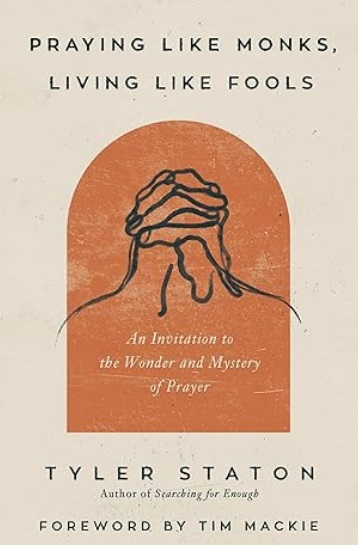In his book, Praying Like Monks, Living Like Fools, Tyler Staton spends a wonderful chapter writing about the famous phrase in the Lord’s Prayer: “Your kingdom come, you will be done, on earth as it is in heaven,” and encourages us towards both an intellectual and physical release during prayer.
He writes:
“This is how Jesus teaches us to intercede. There are to movements to intercession: releasing and asking.
Your will be done. This part of the prayer is about releasing control. Think of something in you life you’re wrestling for control over. Name one thing you’ve never released to God, or perhaps released in the past but are trying to grab back. When you’ve come up with it, name it, and release it.
As for filling from the Spirit in place of releasing, peace in place of anxiety, trust in place of fear, and so on.
Posture can be helpful in this act of prayer. As you open your hands, picture in your hands some part of your life, something you’re clenching tightly to and trying to force your own will on. When you are ready, flip over your hands, releasing control to God, setting those circumstances at the feet of Jesus.
…. Your kingdom come on earth as it is in heaven. Having released control and surrendered our own will, we are now free to see our lives, our relationships, our community, and our world through the eyes of God. It is from this place that we ask with hearts full of faith and hope…. ask for for Jesus to come — anywhere and everywhere you know God’s kingdom of love and peace is lacking.”
End quote.
Now… if you come from a Protestant Christian tradition (as I do), you’re probably aware that we don’t do much embodied stuff.
In fact, a great loss from the Reformation was the stripping away of so much ritual.
These days, embodiment, in most Protestant Christian circles, often only goes so far as raising our hands during worship (a wonderful thing to do, by the way).
But ritual and embodied practice is a Scriptural theme, from beginning to end, and beginning and ending our day with a prayer similar to Staton’s can be powerful.
Try it some time. I’m still getting used to it.
So much about anxiety is about certainty, isn’t it? Fearing it. We crave certainty. We don’t want to let go of the idea that we can know.
It’s often pure anguish to pray: “Not my will, but yours be done,” because we dread what God’s will might mean.
I know. It’s really really wrenching.
It’s also often a sign of an anxiety disorder. Not faulty spirituality. And there are numerous physical explanations for why letting go is so much harder for some of us than others. Never feel ashamed, or that you lack faith based on defective spirituality. And read the rest of this site for more explanation on why your condition is NOT based on a lack of faith.
So, even to this post about an excellent prayer of release, I will apply my universal post-script.
For readers from the United States….
Find a psychiatrist here.
Find a therapist here.
For readers, internationally, please seek help where you can find it.

